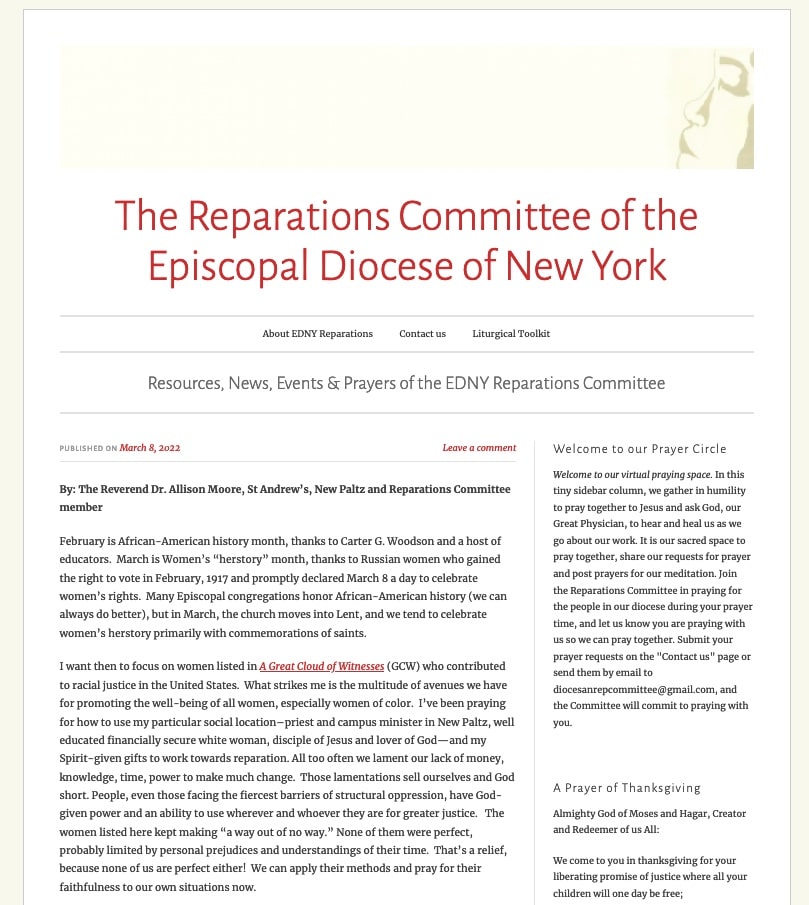The Diocesan Reparations Committee
Collecting and documenting evidence of the benefits derived by the diocese from the institution of slavery
Upcoming Events
Our definition of Reparations:
Reparations is the process to remember, repair, restore, reconcile and make amends for wrongs that can never be singularly reducible to monetary terms. The process of reparations is “an historical reckoning involving acknowledgement that an offense against humanity was committed and that the victims have not received justice.*”
*Passage in quotes offered by Bernice Powell Jackson, Executive Minister for Justice Ministry, The United Church of Christ.
The New York Diocesan Reparations Committee was created by the 330th Diocesan Convention in response to three 2006 General Convention resolutions calling on dioceses to respond to the Transatlantic Slave Trade and its aftermath of segregation and discrimination. The role of the Reparations Committee is to collect and document information on the complicity of the Diocese of New York in the institution of slavery and its subsequent history of segregation and discrimination. The committee will consider the benefits the Episcopal Church derived from the institution of slavery and collect, through documentation and storytelling, information on historical and present-day privilege and under-privilege in order to discern a process toward restorative justice. The Committee’s findings will help to determine whether the diocese is called to conduct a truth and reconciliation process with regard to the legacies of racial discrimination and oppression. In order to facilitate the storytelling and documentation of congregations, the Reparations Committee has produced a DVD for churches called, The Diocese of New York Examines Slavery: Talking About Reparations, Repair and Reconciliation. It is a 30-minute exploration of the Church’s involvement in the Transatlantic Slave Trade. Congregations are asked to view the DVD and use it as a guide in helping them examine the history of their church and its connection to the Transatlantic Slave Trade and its aftermath of segregation and discrimination – including economic benefits, the establishment of separate chapels for Africans, the seating of Africans in balconies of churches, the construction of churches by enslaved people, the ownership of slaves by early rectors or the work of church abolitionists. Members of the New York Reparations Committee are requesting that congregations examine their histories and send their findings to Committee members in compliance with General Convention Resolution A123.
Mission Office Contacts
The Rev. Yamily Bass-Choate
Liaison for Global Mission
Office: 212-316-7432
Fax: 212-932-7345
ybass-choate@dioceseny.org
The Rt. Rev. Mary D. Glasspool
Bishop Assistant
Office: 212-316-7442
bpglasspool@dioceseny.org
Ms. Michelle Chang
Executive Assistant to the Bishop Suffragan and the Assistant Bishop
Office: 212-316-7484
Fax: 212-316-7405
mchang@dioceseny.org
Visit the Reparations Committee’s Website
Click here or on the screenshot above to visit the Reparation Committee’s website.
Follow the Reparations Committee on Facebook
2019 Resolution re: Task Force Concerning the Participation of theEpiscopal Diocese of New York in the Slave Trade
Download 697.12 KBRecommended Reading on Race - Comprehensive List (2023)
Download 308.09 KB2018 Resolution Addressing Next Steps After Lamentations (as amended)
Download 153.27 KBRuby Sales' 2018 Absalom Jones Sermon
Download 95.89 KBYear of Lamentations Brochure
Download 12.54 MB- 1
- 2




